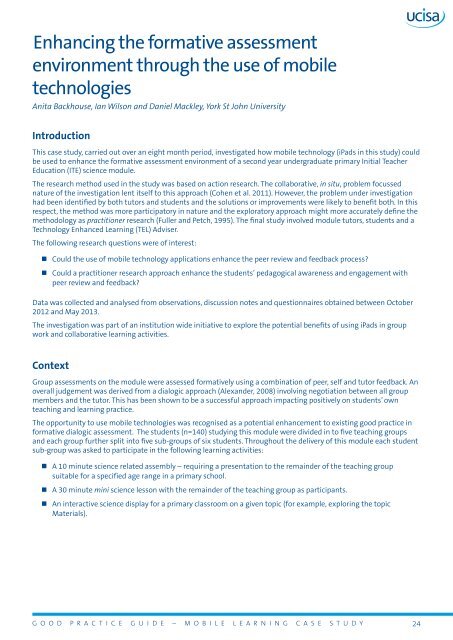1ix7F4Z
1ix7F4Z
1ix7F4Z
You also want an ePaper? Increase the reach of your titles
YUMPU automatically turns print PDFs into web optimized ePapers that Google loves.
Enhancing the formative assessment<br />
environment through the use of mobile<br />
technologies<br />
Anita Backhouse, Ian Wilson and Daniel Mackley, York St John University<br />
Introduction<br />
This case study, carried out over an eight month period, investigated how mobile technology (iPads in this study) could<br />
be used to enhance the formative assessment environment of a second year undergraduate primary Initial Teacher<br />
Education (ITE) science module.<br />
The research method used in the study was based on action research. The collaborative, in situ, problem focussed<br />
nature of the investigation lent itself to this approach (Cohen et al. 2011). However, the problem under investigation<br />
had been identified by both tutors and students and the solutions or improvements were likely to benefit both. In this<br />
respect, the method was more participatory in nature and the exploratory approach might more accurately define the<br />
methodology as practitioner research (Fuller and Petch, 1995). The final study involved module tutors, students and a<br />
Technology Enhanced Learning (TEL) Adviser.<br />
The following research questions were of interest:<br />
• Could the use of mobile technology applications enhance the peer review and feedback process?<br />
• Could a practitioner research approach enhance the students’ pedagogical awareness and engagement with<br />
peer review and feedback?<br />
Data was collected and analysed from observations, discussion notes and questionnaires obtained between October<br />
2012 and May 2013.<br />
The investigation was part of an institution wide initiative to explore the potential benefits of using iPads in group<br />
work and collaborative learning activities.<br />
Context<br />
Group assessments on the module were assessed formatively using a combination of peer, self and tutor feedback. An<br />
overall judgement was derived from a dialogic approach (Alexander, 2008) involving negotiation between all group<br />
members and the tutor. This has been shown to be a successful approach impacting positively on students’ own<br />
teaching and learning practice.<br />
The opportunity to use mobile technologies was recognised as a potential enhancement to existing good practice in<br />
formative dialogic assessment. The students (n=140) studying this module were divided in to five teaching groups<br />
and each group further split into five sub-groups of six students. Throughout the delivery of this module each student<br />
sub-group was asked to participate in the following learning activities:<br />
• A 10 minute science related assembly – requiring a presentation to the remainder of the teaching group<br />
suitable for a specified age range in a primary school.<br />
• A 30 minute mini science lesson with the remainder of the teaching group as participants.<br />
• An interactive science display for a primary classroom on a given topic (for example, exploring the topic<br />
Materials).<br />
G O O D P R A C T I C E G U I D E – M O B I L E L E A R N I N G C A S E S T U D Y 24


